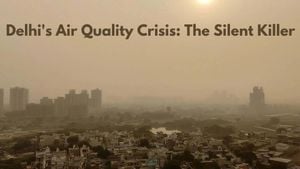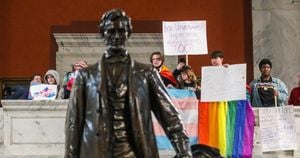During a landmark visit to the Amazon rainforest on Sunday, President Joe Biden became the first sitting U.S. president to witness the devastation caused by drought and deforestation firsthand, emphasizing the need for urgent climate action as he prepares to pass the reins of power to his successor, President-elect Donald Trump.
Biden’s visit to the world’s largest tropical rainforest came at a time when the region faces unprecedented environmental challenges. The Amazon, nearly the size of Australia, plays a pivotal role in the global fight against climate change, storing massive amounts of carbon dioxide—increasingly threatened by illegal logging, agriculture, and climate-induced drought.
“The fight against climate change has been a defining cause of my presidency,” Biden stated during his visit. “I will leave my successor and my country with a strong foundation to build on, if they choose to do so. But nobody—nobody—can reverse the clean energy revolution that's underway.”
During his aerial tour aboard Marine One, Biden observed the stark realities of environmental degradation: drying riverbeds, eroded shorelines, and smoke billowing from widespread forest fires—the worst the region has seen in decades. Ships are now stranded on the dry riverbanks, and sustainable fishing methods employed by Indigenous communities are endangered.
At the heart of his mission, Biden announced Nov. 17 as "International Conservation Day" and committed the U.S. to spending significant amounts on restoring the Amazon, planting native tree species, and enhancing biodiversity efforts. He reiterated previous pledges, promising $50 million for the Amazon Fund, part of the Brazilian government's broader strategy to combat deforestation. This contribution brings total U.S. support to $100 million, out of the $500 million aid Biden promised last year.
Meeting with Indigenous leaders was another highlight of Biden's trip. He expressed admiration for their stewardship of the land and culture, reinforcing the narrative of inclusive climate action. “The Amazon might be the lungs of the world,” he said, “but it is also the heart and soul of the world, inspiring us to unite and protect our environment.”
The President’s visit takes place against the backdrop of the U.N. climate conference currently underway, where many world leaders are plotting climate strategies without key players like the U.S. actively leading the charge on environmental policy. The disparity brings heightened concern about the Amazon's fate and what will become of international agreements on climate action under Trump’s presidency, which has shown skepticism about climate change and has threatened to withdraw from global pacts like the Paris Agreement.
Echoing optimism, Biden noted, “Some may seek to delay the clean energy revolution, but people everywhere—regardless of party—are enjoying its benefits.” His assertion reflects the reality many Americans are already experiencing as the U.S. pushes toward renewable energy sources, cleaner air, and water.
Despite positive gestures and proclamations, experts express skepticism about the tangible outcomes of Biden's visit. Suely Araújo, the former head of Brazil's environmental protection agency, cautioned, “We can't expect concrete results from this visit, especially when the incoming administration has shown little commitment to our environmental responsibilities.” She doubted whether any real investment would follow once Trump took office, indicating potential setbacks for global climate initiatives.
Before heading to his next destination, Rio de Janeiro, to attend the G20 summit, Biden highlighted the urgency of the current crises the Amazon faces, citing exacerbated drought conditions impacting riverine communities and forest health. Over the past two years, the Amazon has been under siege from historic drought, resulting in unprecedented wildfires burning larger areas than ever before.
With about two-thirds of the Amazon located within Brazil, the fate of this diverse biome rests heavily on local policies. Brazilian President Luiz Lula da Silva has committed to halting illegal deforestation by 2030; yet, concerns linger about the effectiveness of these measures under shifting political tides.
Reflecting on the shared responsibility for these natural wonders, Biden stated, “The fight to protect our planet is literally a fight for humanity.” The stakes could not be higher, as the Amazon houses over 10% of the world's biodiversity and is home to numerous Indigenous communities who depend on its resources for survival.
Looking forward, Biden's South America trip emphasizes the partnership between the U.S. and Brazil as both countries grapple with the immediate and long-term effects of climate change. His administration plans to continue pressing for greater accountability, both domestically and globally, to protect this irreplaceable ecosystem.
With meaningful actions still to be seen, the global community watches anxiously as the transition to Trump takes place and the new political realities begin to set the tone for climate governance over the coming years. Regardless, Biden’s lofty objectives serve as reminders of the collective duty to safeguard our planet’s natural resources, augmenting hope for future sustainability efforts.



